Sports
/ArcaMax
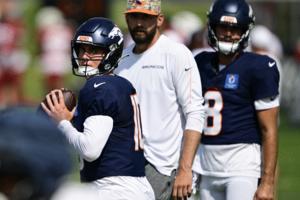
Troy Renck: Broncos QB Bo Nix has glitch. He thinks too much.
DENVER — Bo Nix has a glitch. He thinks too much.
His greatest strength — a quick processor — is mental hardware that causes his athletic software to malfunction.
He is hard on himself. Too hard. He wants to be right on every play, in every drill. In interviews, he provides glimpses of his competitive spirit and unbending expectations. ...Read more
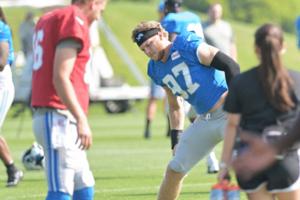
John Niyo: Lions make a joint statement with Dolphins in town
ALLEN PARK, Mich. — They set the tone early, and the Detroit Lions carried it through two full days of joint practices.
And when it was finally over, with Tua Tagovailoa and the Dolphins’ offense going four plays and out in a game-ending simulation to cap Thursday’s 90-minute workout, the “tonality,” as Miami coach Mike McDaniel ...Read more

Matthew Stafford's back injury continues to be a nuisance for Rams
LOS ANGELES — Matthew Stafford didn't participate in the Rams' joint practice with the New Orleans Saints on Thursday in Carson, but the team hopes he can take meaningful steps this weekend toward a return from injury.
Stafford, who has missed the entirety of training camp because of an aggravated disc in his back, is scheduled to work out ...Read more
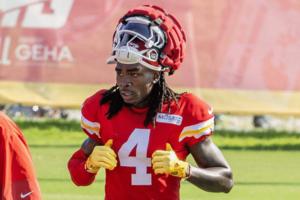
Chiefs' Rashee Rice reportedly will be available to play in first month of season
KANSAS CITY, Mo. — From the Chiefs’ perspective, there seems to be little doubt that receiver Rashee Rice will be punished by the NFL for his role in a March 2024 six-car crash on a Dallas freeway.
It’s more a matter of how long that suspension will last.
But any NFL punishment apparently won’t come for at least six weeks. ESPN’s ...Read more
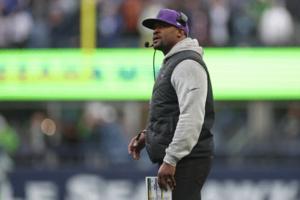
Brian Flores' NFL lawsuit can go to trial after court rules against Roger Goodell arbitration
NEW YORK — Minnesota Vikings defensive coordinator Brian Flores can take his discrimination cases against the NFL, New York Giants, Denver Broncos and Houston Texans to an open federal court in front of a jury, a federal appeals court reaffirmed Thursday.
The 2nd U.S. Circuit Court of Appeals upheld a March 2023 ruling by U.S. District Judge ...Read more
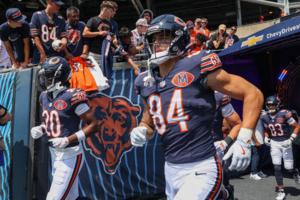
Paul Sullivan: Can the new face of the next generation of McCaskeys save the Bears?
CHICAGO — Some big news out of Halas Hall last week was buried on a day when Chicago Bears Chairman George McCaskey and President/CEO Kevin Warren updated the stadium plans and coach Ben Johnson announced he wouldn’t play Caleb Williams or most other starters in a meaningless preseason opener.
Edward L. McCaskey was named to the seven-...Read more
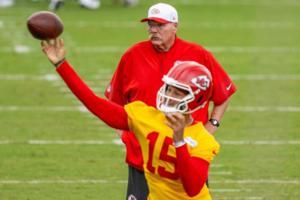
Vahe Gregorian: How 'don't judge' motto explains Chiefs coach Andy Reid's success
KANSAS CITY, Mo. — If you’ve followed the Chiefs in the Andy Reid era, you know that he’s the fourth-winningest coach in NFL history because he’s a unique fusion of his compelling experiences.
He’s both a brilliant tactician and a taskmaster. Equal parts encouraging and exacting. And pragmatic with a playful side — a blend befitting...Read more
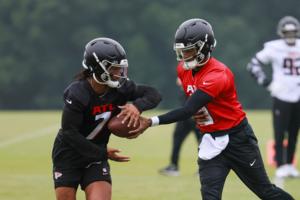
Ken Sugiura: Falcons' Bijan Robinson's next step to greatness is both boring and telling
FLOWERY BRANCH, Ga. — As Bijan Robinson starts his third season in the NFL, his position coach said what any Atlanta Falcons fan should want to hear about the star running back.
Not only does Robinson care about improving, but he is willing to dive into the mundane process of getting better at the small details that few people notice. As ...Read more

Bucs general manager Jason Licht says he regrets drafting Devin White
TAMPA, Fla. — Devin White is trying to earn a starting job with the Raiders, his third team since the former No. 5 overall pick left the Bucs following the 2023 season.
In Las Vegas, White is reunited with John Spytek, a key member of Tampa Bay’s front office for nine seasons and now Raiders general manager. Spytek, a former Bucs assistant ...Read more
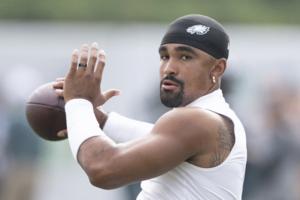
Jalen Hurts huddles with another highly scrutinized QB, Shedeur Sanders, after Eagles-Browns workout
PHILADELPHIA — Long after the double air horn sounded to signal the end of joint practice with the Cleveland Browns on Wednesday, Jalen Hurts remained on the field.
The huddles had broken down. Players had consumed their cups of Rita’s water ice and headed back indoors. But Hurts stood on the far end of one of the practice fields in deep ...Read more
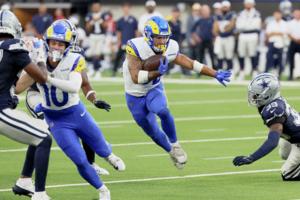
How did the Rams become LA's most valuable sports franchise, soaring past $10 billion?
LOS ANGELES — A decade ago, the languishing St. Louis Rams were ranked dead last in the NFL with a franchise valuation of $930 million.
Faced with an unappealing stadium lease and dwindling prospects in St. Louis, the Rams turned their attention westward, toward their Los Angeles roots. Quietly, they acquired two parcels of land at the former...Read more

Brad Biggs: Has Bears left tackle competition become a 4-man battle? Not necessarily -- but it's gray.
CHICAGO — Assistant coaches were made available to the media Wednesday for the first time since the Chicago Bears opened training camp, and one thing they said they appreciate about coach Ben Johnson is how there’s a clear distinction for everything being done.
It’s black and white.
Both passing game coordinator Press Taylor and ...Read more
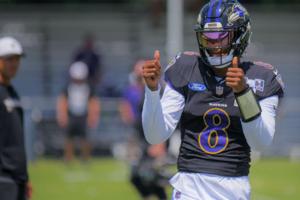
Ravens' Lamar Jackson ends trademark battle with Troy Aikman over No. 8
BALTIMORE — Ravens quarterback Lamar Jackson has withdrawn his challenge to Hall of Fame quarterback Troy Aikman’s trademark use of the No. 8.
In a decision to dismiss the case published Tuesday, the U.S. Patent and Trademark Office revealed that the two-time NFL Most Valuable Player filed to withdraw the challenge Monday after originally ...Read more

Jets RB Breece Hall: 'I'm still the same threat that I've always been'
NEW YORK — Last week, Breece Hall shook up social media with three cryptic words.
“Time will tell.”
During Wednesday’s press conference, Hall might have expressed what he meant when asked what has changed about the Jets offense for him from last year to this year.
“Nothing really,” Hall said. “I think people try to make a skewed...Read more
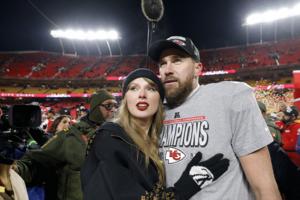
Mike Sielski: Taylor Swift and Travis Kelce share a deeper connection than you might think. I hope 'New Heights' explores it.
PHILADELPHIA — The first question you have to ask yourself when you’re writing about a deep and unseen connection between Taylor Swift and Travis Kelce is what to call them after your first reference to them. Are they Swift and Kelce? That would be standard practice at a website or publication such as The Philadelphia Inquirer, a legacy ...Read more
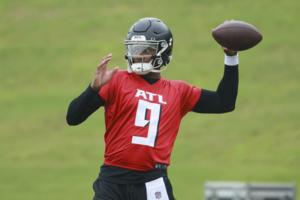
Falcons QB Michael Penix Jr. starts scuffle with Titans during joint practice
FLOWERY BRANCH, Ga. — Atlanta Falcons quarterback Michael Penix Jr. touched off a major rumble and then pronounced himself ready for the regular season at the conclusion of joint practices with the Tennessee Titans on Wednesday.
About midway through the session, Penix tossed a touchdown pass to receiver Ray-Ray McCloud III and had words with ...Read more

How horse anatomy and losing his father prepared Eagles rookie Ty Robinson for life after football
PHILADELPHIA — The surgical viewing window and other rooms inside Arizona Equine provided Ty Robinson with an introductory course in anatomy and a baseline for his future.
“Gnarly” became normal, said Robinson, the Eagles’ 24-year-old rookie defensive tackle, who would often join his mother, Tresha, an equine veterinarian, at her ...Read more
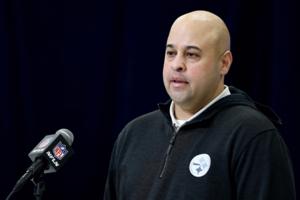
Jason Mackey: Steelers' GM Omar Khan has built his deepest roster yet. Will it pay off in the end?
PITTSBURGH — It was the splashiest offseason in Steelers history, at least with outside additions. Aaron Rodgers, DK Metcalf, Jalen Ramsey, Jonnu Smith … there are soap operas with blander plots.
But it hasn’t just been the marquee names.
If anything, the added roster depth has been just as impressive.
Good timing, too.
Entering his ...Read more

Chargers' Ladd McConkey can finally learn from Keenan Allen in person
LOS ANGELES — Even before Keenan Allen returned to the Chargers last week, he was already making an impact in the receiver room.
As a rookie, Ladd McConkey studied Allen’s practice film on his team-issued iPad, trying to absorb lessons from one of the league’s best route runners — the very player whose rookie records for receptions and ...Read more
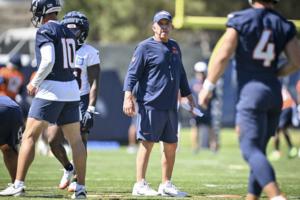
For detail-obsessed Sean Payton, abnormal Broncos training camp has been a challenge
DENVER — Sean Payton is a noted stickler for details, even beyond the normal standards of an obsessive group like professional football coaches.
That has made this Broncos training camp a different kind of challenge for Denver’s head coach. The Broncos went to the Bay Area last week for a joint practice and preseason game with the San ...Read more
Popular Stories
- Chiefs' Rashee Rice reportedly will be available to play in first month of season
- Brian Flores' NFL lawsuit can go to trial after court rules against Roger Goodell arbitration
- Matthew Stafford's back injury continues to be a nuisance for Rams
- Troy Renck: Broncos QB Bo Nix has glitch. He thinks too much.
- Paul Sullivan: Can the new face of the next generation of McCaskeys save the Bears?





